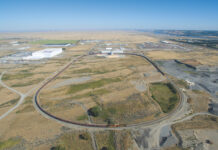By Roneshia Thomas
From the May / June 2023 Issue
Ports and Foreign Trade Zones (FTZs) are at the center of the importing and exporting of goods domestically and internationally. There are over 300 ports in the United States that are owned and operated by states, counties, municipalities, and privately-owned companies.
To support the continued growth of the maritime transportation industry, the U.S. Department of Transportation introduced the MARAD program. This ports-focused program supports projects that improve the safe, efficient, or reliable movement of goods into, out of, or within a port. DOT manages the intermodal transportation network, ensuring its role as a main contributor to the nation’s economic and national security posture.

In combination with ports, FTZs are a mainstay in the trading industry. Foreign-trade zones are designated sites licensed by the Foreign-Trade Zones Board at which special customs procedures may be used. Since 1934, the federal government has helped encourage activity and value-added at facilities in competition with foreign alternatives by allowing delayed or reduced duty payments on foreign merchandise.
There are several advantages to considering FTZs when looking to build manufacturing or distribution facilities. Such as:
- No duties on imported goods that are later re-exported
- Delayed payment of duties on goods that enter the U.S. market
- Manufacturing-specific benefits—with case-by-case approval by the FTZ Board—that can include reduction of duties if a lower tariff rate applies to the finished product leaving the zone than the tariff rates that would have applied on foreign components (“inverted tariff”)
- Elimination of duties on waste, scrap, and rejected or defective parts
- Reductions in merchandise processing fees because zone users may be able to file a single customs “entry” (and pay a single fee) per week rather than making multiple entries during the course of a week
The American Association of Port Authorities (AAPA) has added another component intended to not only cut costs but support a healthy environment, the Hydrogen for Ports Act. This legislation was introduced this year to support the adoption of hydrogen in the port industry. Hydrogen energy infrastructure has the potential to start a wave of growth in maritime transportation while creating another tool in the energy mix to mitigate emissions. Due to ports being big movers and users of energy, hydrogen will allow ports to cut costs dramatically.
Despite ports and FTZs needing the approval of local U.S. Customs and Border Protection officials, sites and facilities remain within the jurisdiction of local, state, or federal governments or agencies.
Greater Fort Lauderdale, FL: Hub For International Commerce
Home to Port Everglades, two Foreign Trade Zones (FTZs) and Fort Lauderdale-Hollywood International Airport (FLL), Greater Fort Lauderdale is an outstanding location for individuals and companies looking to do business on a global scale.
“Greater Fort Lauderdale offers powerhouse foreign trade assets on a convenient, easy-to-access scale in a business-friendly community ready to welcome and expedite global business,” said Bob Swindell, President and CEO of the Greater Fort Lauderdale Alliance, Broward County’s official public/private partnership for economic development.
Located in the heart of Greater Fort Lauderdale, minutes from downtown Fort Lauderdale and Fort Lauderdale-Hollywood Iternational Airport, Port Everglades is not only one of the world’s busiest cruise ports with the distinction of having the most homeported cruise ships, but it is also Florida’s top container port and the region’s main seaport for receiving gasoline, jet fuel, and other petroleum products. Port Everglades is also home to Florida’s first and largest Foreign Trade Zone.
“Greater Fort Lauderdale offers powerhouse foreign trade assets on a convenient, easy-to-access scale in a business-friendly community ready to welcome and expedite global business.”
— Bob Swindell, President / CEO, Greater Fort Lauderdale Alliance
Port Everglades is among the nation’s leading ports, exceeding one million TEUs (20-foot equivalent units, the industry’s standard measurement for containers) during Fiscal Year 2021 and is anticipated to set a port record for Fiscal Year 2022. About 15% of all U.S.-Latin American trade moves through Port Everglades, which is the number one refrigerated cargo port in Florida. Overall, the port’s shippers serve more than 150 ports in 70 countries around the world.
The port’s 20-year Master/Vision Plan includes expansions to support future growth in containerized global trade. In 2020, the U.S. Army Corps of Engineers approved the first phase of deepening and widening the port’s navigational channels. Overall, Port Everglades generates $30.4 billion worth of annual economic activity and more than 7,000 direct local jobs, according to a recent study.
Broward County is home to two FTZs, secured sites in the U.S. that are outside of the jurisdiction of U.S. Customs and Border Protection. This allows importers to import and ship cargo without paying customs duties and federal excise taxes, and to re-export with no duties or quota charges.
FTZ 25
FTZ 25 is located at Port Everglades, between Midport and Southport and throughout Broward County. It is operated by the Broward County Board of County Commissioners. The FTZ actively utilizes 22.7 acres of the 82-acre tract with a secure, fenced, and illuminated facility including five warehouses offering 388,500 square feet of space with around-the-clock access. The FTZ also encompasses 25 additional designated sites within Broward County.
FTZ 241
FTZ 241 is located at Fort Lauderdale Executive Airport (FXE) and throughout Broward County. It is operated by the City of Fort Lauderdale. FTZ 241 encompasses 1,300 open acres with five warehouses totaling 338,000 square feet of space. FXE serves as the hub site with 12 satellite sites located in the City of Fort Lauderdale and other parts of Broward County.
Visit GFLAlliance.org for more information.














![[VIDEO] Get More for Your Business in Ardmore. Oklahoma](https://businessfacilities.com/wp-content/uploads/2024/02/maxresdefault-324x160.jpg)
